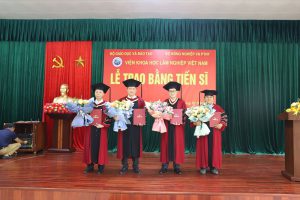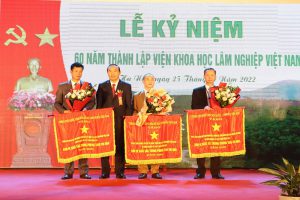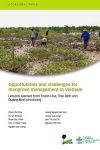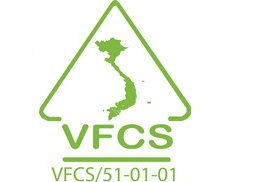1. MORPHOLOGICAL AND ANATOMICAL CHARACTERISTICS OF THE LEAVES OF SOME MELALEUCA SPECIES AND THEIR HYBRIDS
Hoang Vu Tho
Forestry University
Pham Duc Tuan
Forestry Department
SUMMARY
This study investigated the morphology and anatomy of the leaves of some interspecies crossing combinations of Melaleucas which were grown for testing in 2004 on swampy, seasonally flooding ground at Gia Vien county, Ninh Binh province.
The research aims at determining the difference between hybrids and their parents. Three species involved in crossing were M. leucadendra, M.cajuputi and M. viridiflora. Results show that morphological parameters of leaves such as length of leafstalk, length and width of leaf, length/width index and leaf surface area of the hybrids are fairly intermediate between that of their parents. The structural and anatomical parameters, such as average number of stoma per mm2 and average measurement of stoma are also intermediate.
Additionally, the cross combinations also indicate their heterosis over their parents as regards to some studied characters. For example, heterosis in V36Ca31 combination indicates an increases of 22,22% in the length of leafstalk and of 10,34% in the width of leaf. Heterosis in L23V43 combination increases 25,00%; 9,02% and 3,08% in the length of leafstalk, the length of leaf and leaf surface area respectively. Thus the crossing combinations indicate not only intermediate attitudes but also heterosis though these vary across the studied characters.
Keywords: Morphology, Anatomy of the leave of some Melaleucas
2. MICHELIA GIOII (A. CHEV.) SIAMA & H. YU OF MAGNOLIACEAE FAMILY IN VIETNAM
Vu Quang Nam
Forestry University
SUMMARY
Michelia gioii (A. Chev.) Sima & H. Yu (gioi Annam) is usually distributed in Northern Vietnam and was first published in the Bulletin Economique (de l’Indochine) 21 (1918: 790) by A. Chevalier with the name of Talauma gioi A. Chev. However, up to now this species, or its existence in Vietnam, has not been recognized by most taxonomic monographs. Based on the type specimens of Service forestier-38204 and Fleury in Chevalier-30158 (located in Paris) and their morphological characteristics, Michelia gioii (A. Chev.) Sima & H. Yu is confirmed and introduced here with its description, habitat, distribution, and uses.
Keywords: Michelia gioii (A. Chev.) Sima & H. Yu, Michelia.
3. COMPOSITION OF TREE SPECIES OF ECOSYTEM ON HILLS IN CU CHI DISTRICT, HO CHI MINH CITY
Dang Van Son
Institute of Tropical Biology
Nguyen Nghia thin
Vietnam National University, Hanoi
Summary
An assessment of natural resources at Cu Chi, a land-area with heroic traditions, was carried out. The survey results identified 117 species, 85 genera, 40 families, and 23 orders belonging to angiosperms in Cu Chi District, Ho Chi Minh City. Of these, 92 species are used by people for medicament, ornaments, wood, oleoresin, fruit-tree, or tannin, and 13 species are listed for conservation by the International Union for Conservation of Nature and Natural Resources (IUCN, 2007) and Vietnam Red Data Book, Part II. Plants (2007).
Keywords: Cu Chi, Ho Chi Minh City, Plant composition, Use, Conservation
4. RESEARCH ON THE REATIONSHIP BETWEEN MEASURED FACTORS AND BASE DIAMETER, BEING THE SCIENTIFIC BASIS FOR ACCURATELY DETERMINING STEM VOLUME AND SO TRACKING DOWN THE LOST VOLUME OF ACACIA TREES IN HAM YEN DISTRICT, TUYEN QUANG PROVINCE.
Ngo The Long
Hung Vuong University, Phu Tho
Summary
Acacia mangium, a medium diameter and fast growing species, was planted across a wide area at Ham Yen, Tuyen Quang. The results of research on the relationship between measured factors of trunk and base diameter show that there exists an extremely-close relationship between diameter at breast height and base diameter (R>0,9), tree total height relates closely to not only base diameter but also diameter at breast height (R>0,7). The results of the research help with using the relational equation between stem volume and base diameter to allow for a more accurate volume to be calculated for Acacia trees with high fidelity (error <5 %), and ensuring no volume is unaccounted for.
Keywords: Acacia mangium, Relation, Growth, Stem volume
5. STUDY ON THE EFFECT OF GIBBERELLINE GA4/7 APPLICATION FOR FLOWER PRODUCTION IN PINUS MERKUSII SEED ORCHARDS
Nguyen Tuan Hung
Nguyen Duc Kien, Ha Huy Thinh
Research Centre for Forest Tree ImprovementForest Science Institute of Vietnam
SUMMARY
Study on stimulation to produce early flowering in large amounts is an important method for forest tree improvement in order to shorten the breeding cycle and raise the productivity of seed to provide for plantation requirements. Gibberreline is a chemical which is applied in many countries, especially on Pinus. Pinus is a late flowering species and the period from flowering to seed collection lasts nearly two years. The research objective is to determine timing and a suitable Gibberelline GA 4/7 dose to stimulate Pinus merkusii.The results show that using Gibberelline GA4/7 at the right time and dosage raises the amount of male and female cones significantly in comparison with the control formula. Each grafting clone reacts differently to GA4/7, however, the most suitable dose for most Pinus merkusii grafting clones at 11 years is 150 mg/graft and the optimal time is in October.
Keywords: Pinus merkusii, Gibberelline GA4/7
6. IN VITRO PROPAGATION OF CARIBEAN PINE (PINUS CARIBAEA)
Kieu Phuong Nam, Cao Quoc Liem, Tran Trung Hieu, Bui Van Le
Department of Biology, University of Science, Ho Chi Minh city
Kieu Thanh Tinh
Centre of South Eastern Forest Science and Production, Forest Science Institute of Vietnam
SUMMARY
Our aim in this study is to reveal the role of three factors that dramatically affect the efficacy of in vitro propagation process of Pinus caribaea. These are: 1. the effect of increasing effectiveness of sterilization of benzoic acid treatment (93.33%); 2. for the initial step of the process, young shoots carrying bud dormancy are the most suitable material, which can be obtained on SH medium with 30g/L glucose: 10% coconut water, 2mg/L BA, 0.5mg/L IBA; and finally; 3. an increase in root development can be achieved through hormone shock (80%).Keywords: Vitro propagation, Pinus caribaea
7. STUDY ON GENETIC VARIATION IN CELLULOSE CONTENT BETWEEN FAMILIES AND PROVENANCES IN E. UROPHYLLA FOR DEVELOPING BREEDING FOR KRAFT PULP YIELD
Nguyen Duc Kien, Ha Huy Thinh, La Anh Duong, Do Huu Son, Le Anh Tuan
Forest Tree Improvement Research Centre Forest Science Institute of Vietnam
SUMMARY
Pulp yield is one of the most important characteristics influencing the effectiveness of pulp production. Determination of pulp yield is time consuming, expensive and requires specialized equipment and large quantities of wood chips to be cooked. The aim of this study was to investigate genetic variation in cellulose content between provenances and families in E. urophylla for developing breeding programs for kraft pulp yield in plantations of this species. The diglyme-HCl method was used to evaluate cellulose content in a sample of 275 trees from 62 families in a 10-year-old progeny test of E. urophylla at Ba Vi. Cellulose content displayed non-significant differences between provenances, but significant differences between families within provenance. The phenotypic correlations between cellulose content and growth or wood density were weak to moderate. A selection index for pulp production helped select individuals having good growth, desired wood density and cellulose content.
Keywords: E. urophylla, Cellulose content, Pulp yield, Selection index
8. APPLICATION OF THE MIXED MICRO-ORGANISM PRODUCT IN TABLET FORM (MF1) FOR PINE AND EUCALYPTUS SEEDLINGS IN THE NURSERY
Nguyen Hoai ThuNguyen Manh Ha, Dang Nhu Quynh
Forest Plant Protection DivisionForest Science Institute of Vietnam
Aiming to contribute to the promotion of afforestation across Vietnam by creating high-quality seedlings; the project “Research on technology of producing mixed micro-organism product in tablet form for Eucalyptus and Pine seedlings on degradation sites” was successful in determining the mixed micro-organism product. The tablet form MF1 consists of apatite powder; dust organic; potassium polyacrylamide; and ectomycorrhizal (Pt), bacteria solved phosphate, disease resistant micro-organism and others addictives with 33%; 23%; 30%; and 14% respectively. The project assessed the effect of the mixed micro-organism product in different treatments, based on seedling growth, biomass, disease infection rate and symbiosis rate. Results show that Treatment 1 (1.7 gram of MF1 per seedling) is the most suitable for seedling growth and development in the nursery.
Key words: Mixed micro-organism tablet, Eucalyptus, Pine, Nursery.
9. ENHANCEMENT OF INDUCED DISEASE RESISTANCE OF ACACIA HYBRID USING BACTERIAL ENDOPHYTES
Vu Van Dinh
Economics-Technical College, Lao Cai
SUMMARY
Endophytic microorganisms living in cell tissues of host plants not only cause disease to plants but can also establish beneficial relationships. These microorganisms promote the growth of host plants by creating a biological barrier to control the pathogens which attack host plants. Endophytic bacteria having a high effect in antipathogens were isolated from healthy plants, low and moderately infected plants, while plants which were highly or seriously infected by disease didn’t have any of the effective endophyte bacteria. This difference is also reflected in differences in bacterium density in plants infected by disease to different levels. Bacteria density in healthy plants is higher than in infected plants. Two month old Acacia magium in treatment (effected by effective bacteria clone, B03, with dosage of 15ml per plant and density of 1 x 105CFU/ml) have the ability to enhance reduced disease resistance caused by fungus Colletotrichum gloeosporioides, and also grow better than in the control.
Key words: Induced disease resistance, Acacia hybrid, Endophytic microorganisms
10. ASSESSING DEGRADATION OF RIVERHEAD PROTECTIVE FORESTS FOR THACH HAN RIVER AND PROPOSED SOLLUTONS FOR DEVELOP RIVERHEAD PROTECTIVE FORESTS SUSTAINED
Ngo Dinh Que & CTV
Forest Ecology and Environment Research Centre
SUMMARY
Basing on criterias developed by Research Centre for Forest Ecology and Environment (RCFEE) for determining riverhead protective forests that critically degraded, we applied the criteria to assess the area of riverhead protective forests of Thach Han river, in Quang Tri province. Finally, maps for classification of riverhead protective forests degraded were developed by RCFEE’s experts at 4 different levels. Characteristics and reasons caused forest degradation were assessed through the theme results and some planning sollutions, policy mechanisms, scientific technologies were also proposed to develop riverhead protective forests sustained
Keywords: Riverhead protective forests, degradation
11. RESULTS OF PRESERVATIVE B (A MIXTURE OF NAF AND NA2B4O7) PERMEABILITY CAPACITY OF MATERIALS USED FOR FINE ARTS AND HANDICRAFT PRODUCTS MADE FROM RATTAN (CALAMUS) AND BAMBOO (MACCLUROCHLOA)
Hoang Thi Tam
Forest Products Preservation Research DivisionForest Science Institute of VietnamThe preservative B (a mixture of NaF and Na2B4O7) is penetrated into the bamboo Maclurochloa and the rattan Calamus, which are used for producing handicrafts and fine art products, using the ordinary immersion method at a concentration of 5%. Results show preservative permeability capacity of the materials: Rattan slat moisture 48% Preservative capacity 29,71 g/kg material; Rattan core moisture 48.79% preservative capacity 33.89 g/kg material; Bamboo strip moisture 24.97% preservative capacity 1.09 kg/m3 material; Bamboo slat moisture 24.97% preservative capacity 26.57 kg/m3 material.
Keyword: B preservation, Calamus, Maclurochloa, handicrafts products
12. THROUGH THE SURVEYS ON NATURAL DURABILITY OF SEVEN KINDS OF PLANTATION – GROWN SAWN WOOD DAMAGED BY MARINE HA (TEREDO MAMI AND BANKIA SAULII)
Vu Van Thu
Forest Products Preservation Research DivisionForest Science Institute of Vietnam
SUMMARY
Throughout the surveys on natural durability of seven kinds of plantation-grown sawn wood damaged by marine Ha (Teredo mami and Bankiasaulii), we observed that the natural durability of Ecucalyptus camadulensis timber was best of the seven kinds of timber (Manglietia glauca, Acacia hybrid, Acacia mangium, Acacia auriculiformis, Pinus massoniana lamb, Ecucalyptus Urophylla). Although natural durability of Ecucalyptus camadulensis timber was longest of the seven kind of timber, it maintained availability for only 2 to 4 months. If Ecucalyptus camadulensis timber is not preserved appropriately, it can not exist long in sea water environment.
Key words: Natural durability, Timber damage Ha Teredo mami and Bankia saulii
Latest news
- Vietnam Journal of Forest Science Number 3 - 2006
- Vietnam Journal of Forest Science Number 2 - 2006
- Vietnam Journal of Forest Science Number 3-2009
- Vietnam Journal of Forest Science Number 4-2009
- Viet Nam Journal of Forest Science Number 4-2008






